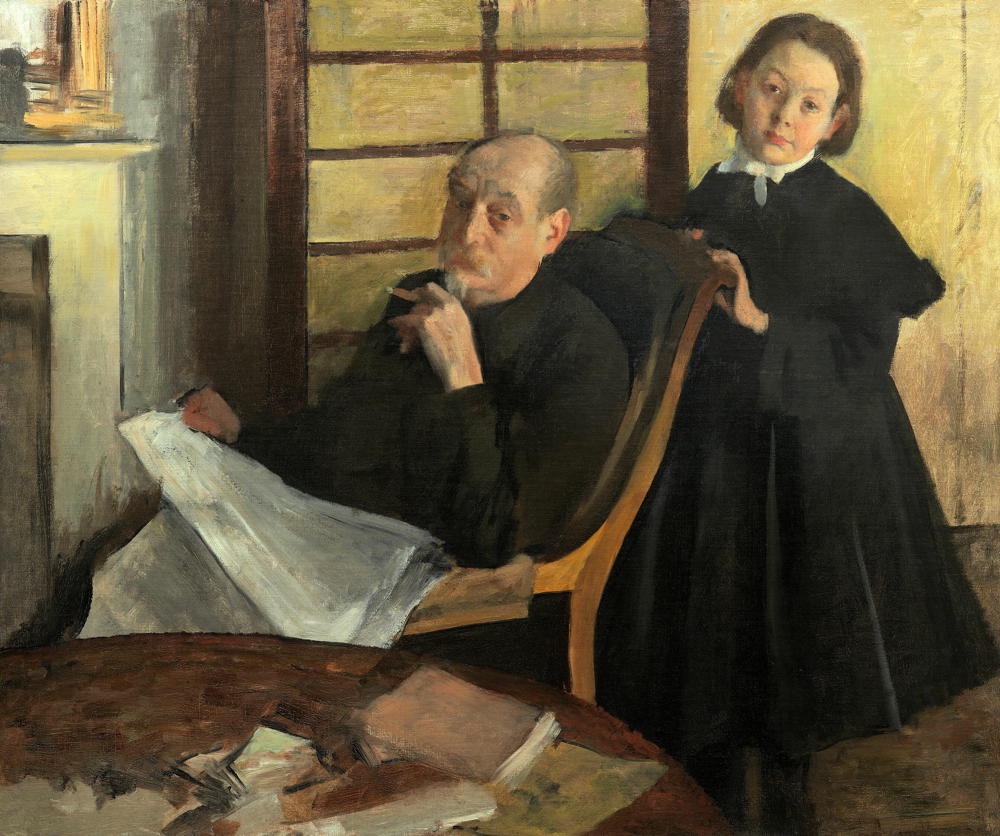Fambly

Edgar Degas:
Henri Degas and His Niece Lucie Degas
(The Artist’s Uncle and Cousin) (1875/76)
“ … Their marriage was long and contentious …”
Family's different. Whatever the usual rules entail, notable exceptions exist for family members. Greater patience might seem necessary, and such patience gets granted without making too much of a spectacle. Family served as the primary medium for your orientation in this world, much more than school, church, or other affiliations. It served as the teacher when nobody noticed anybody teaching anything and the student when nobody noticed anybody learning anything. Its lessons were subtle and sometimes profound. They helped set up patterns that would resonate in your behavior for generations. You probably passed some of them on to your children. You might notice a few appearing in your grandchildren, too. They represent the way your family works.
Families create their own language, which is slightly different from every other family's. They adopt terms they stumble upon, like when my daughter referred to a discussion as a disgustion. Forever after, discussions were spoken of as disgustions, as if in homage to our daughter's brilliance. I named this story Fambly in similar homage. Fambly has long been my personal term for Family. I don't usually use it in public, but reserve it especially for internal use, but when I say "Family," my inner ear hears me pronouncing it "Fambly." Fambly, then, will be my chosen title for this new series of stories. They will focus upon that most fundamental element of life, Fambly.
I chose Fambly as the focus of this series because my Fambly has been asking me to write down our Fambly stories. I became this generation's historian. With The Muse's invaluable assistance, we've broadened and extended the known family history, which has primarily been oral. With these Fambly stories, I will attempt to create more tangible and permanent footprints.
The Muse surprised me a few years back when she reported that she'd followed my paternal grandmother's heritage back to around 500 AD to a particular Roman Prefect whose progeny would contribute to creating some of the crowned heads of Europe. It shouldn't surprise anyone that a skilled administrator might focus their skills upon any civilization or that the infamous hoards might have recruited people with leadership skills to help stabilize their societies, too. The line included various court hangers-on, and often actual royalty, but always family of royalty. My paternal grandmother was never terribly regal. By the time I met her, she'd had a difficult life and worked as a live-in housekeeper. She made tuna sandwiches without the benefit of mayonnaise and chased us kids outside so she could watch "her shows" when she came to sit for us. I could imagine her reliving her regal past as an imagined cast member of The Edge Of Night.
This series snuck up on me. This being a leap year, Spring came just before the twentieth rather than just after, so I was unaware that I'd finished my prior series until after I'd already written the final chapter. I wrote that chapter as if it were any other, and upon reflection, this seems the most realistic way to create any final chapter. Ends might be best untidy. Completions might be most convincing if inadvertent, for none of us know what's coming, and that holds double for endings. We presume that our lives will just continue as they more or less always have when even a casual perusal of any Fambly history finds clear evidence that they don't and never have.
I am learning that some patterns persist across generations, even when nobody knows the background story. Who's to say what's genetic and what's not? Some habit your great-great-great-great grandfather was known for might have manifested in your behaviors, too. As I've discovered my forebears' stories, I've sometimes noticed strong and familiar resemblances across generations. These seem mysterious and might well be nothing more than accidental convergences or odd projections. It seems obvious that those who do not know their Fambly history couldn't possibly know themselves since we are unavoidably the product of our forebears, even when we remain unaware of them.
This story represents my continuing attempt to document my manner of living, an element of Fambly history most often missing. We might know dates and names and a few of the more prominent events, but we only very rarely stumble across much evidence of our anticedents' manner of living and how they went about making their living work. Were they philosophical or stoic, kind or mean, patient or faunching? My mother told the story of her grandmother stirring a batch of beer on her coal-burning stovetop. She was making it for her husband, who had once been her stepbrother before they married. She was spitting into that concoction and referring to her husband as a son-of-a-bitch. Their marriage was long and contentious and produced a batch of hellions! We'll meet the products of their union and many others before we find the end of these Fambly stories.
©2024 by David A. Schmaltz - all rights reserved


